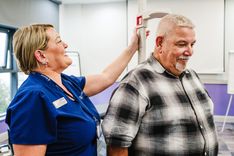
What Age Does Menopause Start?
Menopause is a natural part of ageing when a woman’s periods stop because the ovaries no longer produce eggs and oestrogen levels have fallen significantly. But when does menopause actually start?
In this guide, learn more about when most women will experience menopause, what the different stages of menopause are, and how our Advanced Menopause Package can help you make sense of hormonal changes your body may be undergoing.
When does menopause start?
Officially, the term menopause is used when you haven’t had a period for over a year. For many women, this occurs between the ages of 45 to 55, but for some women, it can occur earlier, which is known as early menopause.
Menopause doesn’t just happen overnight, and most women will start to experience menopausal symptoms years before their periods stop completely. This is referred to as perimenopause and usually starts in your late 40s.
What are the stages of menopause?
Menopause is reached when a woman hasn’t had a period for a year or more. But before and after this, it is normal for women to experience menopausal symptoms. This is often referred to as perimenopause (before menopause) and post-menopause (after menopause).
Perimenopause
The pre-cursor to menopause, perimenopause, is when women start to experience menopause symptoms but are still having periods. Generally, perimenopause starts around four to eight years before menopause, but this can vary from woman to woman. As a result, some women may start experiencing perimenopause in their 40s, while others may experience symptoms in their mid-30s.
Common symptoms of perimenopause include changes to your periods. This can include changes to the frequency of your periods as well as variations in how heavy your flow is. Many women also notice changes in their mood, vaginal dryness, night sweats and hot flushes. These changes are caused by the natural decline in oestrogen and progesterone levels.
Menopause
Menopause is the specific point when your periods stop, and you are no longer able to get pregnant. Once you have gone 12 months without a period, you then enter post-menopause.
Most women will reach menopause by the age of 55, but some women will experience it earlier and others later.
There is no way to know your exact menopause age until it happens, but genetics are thought to play a role, so asking female family members about their experience can sometimes be helpful.
However, other factors, such as certain medical conditions and cancer treatments, can cause early menopause.
Post-menopause
Post-menopause means after menopause, and you reach this point when it’s been 12 months since your last period. Post-menopause signals the end of your reproductive years, as your oestrogen and progesterone levels have dropped so much you can no longer ovulate (release an egg).
It is normal to continue experiencing menopause symptoms for around two to seven years after your last menstrual cycle. But after this time, symptoms should subside.
You are classed as post-menopause for the rest of your life, and it can put you at higher risk of some health conditions, such as heart disease and osteoporosis.
What is early menopause?
Early menopause is when your periods stop before the age of 45. It can happen naturally or be caused by certain health conditions, such as some autoimmune disorders or treatments for other conditions like cancer.
Discover how a menopause blood test can offer insights into whether you may be experiencing early menopause.
How do I know if I have started perimenopause
One of the first signs of perimenopause is changes to your periods. This can be a change to the frequency of your period, its length or how heavy your flow is. Some women also start to experience hot flushes, night sweats, mood changes or sleep changes due to natural fluctuations in hormone levels during perimenopause.
The symptoms of perimenopause and their severity can vary from woman to woman. For some women, they can be very minor, while others may find they significantly impact their day-to-day life.
Learn more about the symptoms of menopause in our guide.
How long does menopause last?
Medically, menopause is simply a point in time when a woman has gone a whole year without having a period. However, the symptoms of menopause can be far longer lasting.
Most women will start to experience symptoms of menopause when they enter perimenopause and continue to experience symptoms for some years post-menopause. Although the length and severity of symptoms can vary, many women will experience symptoms four to eight years before reaching menopause and continue to have symptoms for between two to seven years post-menopause.
When should I seek help managing menopause symptoms
Although some women may not experience severe menopause symptoms, many can find their symptoms cause considerable disruption to their day-to-day lives affecting their work and personal life as well as relationships.
If you are experiencing significant symptoms that you think may be linked to menopause, you should not suffer in silence. Seeking advice from a healthcare professional can help to rule out other potential causes of your symptoms, like thyroid problems, and provide you with better ways to manage your symptoms.
Some common treatment options available for menopause symptoms include:
- Lifestyle changes, such as following a healthy, well-balanced diet, exercising regularly and reducing stress
- Hormone replacement therapy (HRT)
- Counselling or cognitive behaviour therapy (CBT) to help manage mood
- Medications to ease symptoms, such as antidepressants to help stabilise mood, or creams to alleviate vaginal dryness
For more information, read our complete guide to what is menopause.
Check your hormone health
If you are experiencing symptoms you believe may be related to menopause and want peace of mind, book a private Advanced Menopause Profile blood test. At Bluecrest Wellness, this comprehensive package provides insights into five key female hormones as well as a private GP consultation to discuss your symptoms to help determine if you are experiencing menopause. It can also help you plan and adjust treatment options like hormone replacement therapy (HRT) to your bespoke needs.
We offer appointments across the UK, so you can book a menopause blood test at a time and location to suit you. Plus, you can be confident that we will deliver fast, efficient and accurate results as we have established links with leading UK laboratories and are fully accredited for a wide range of private blood checks.
















